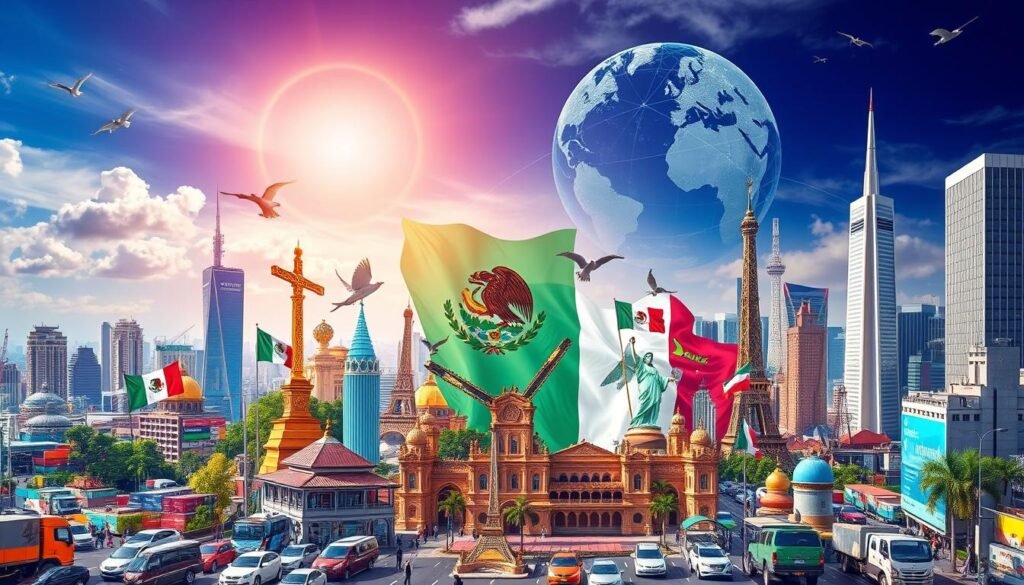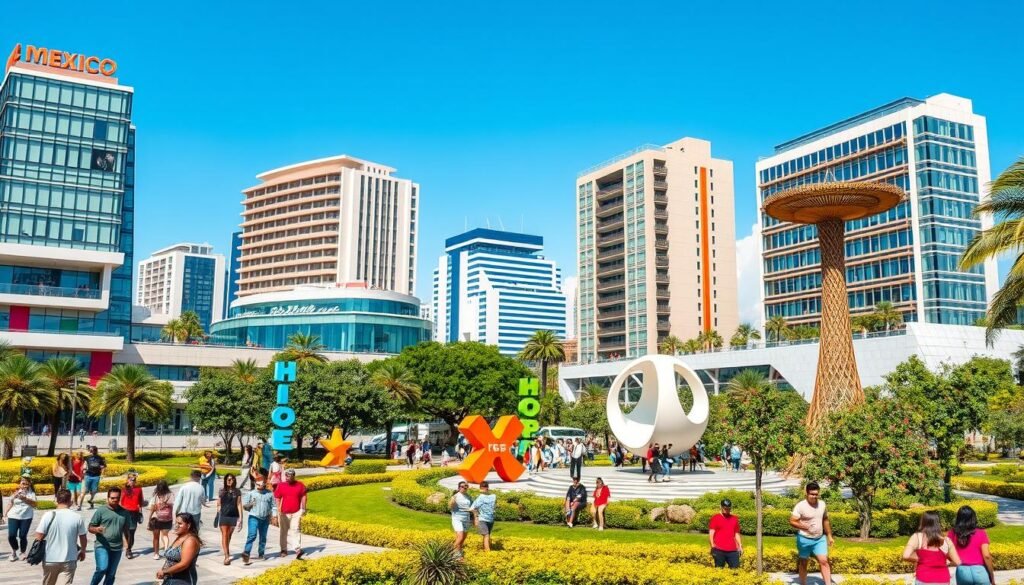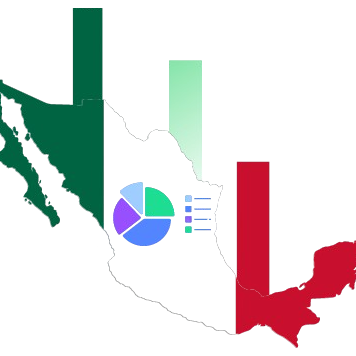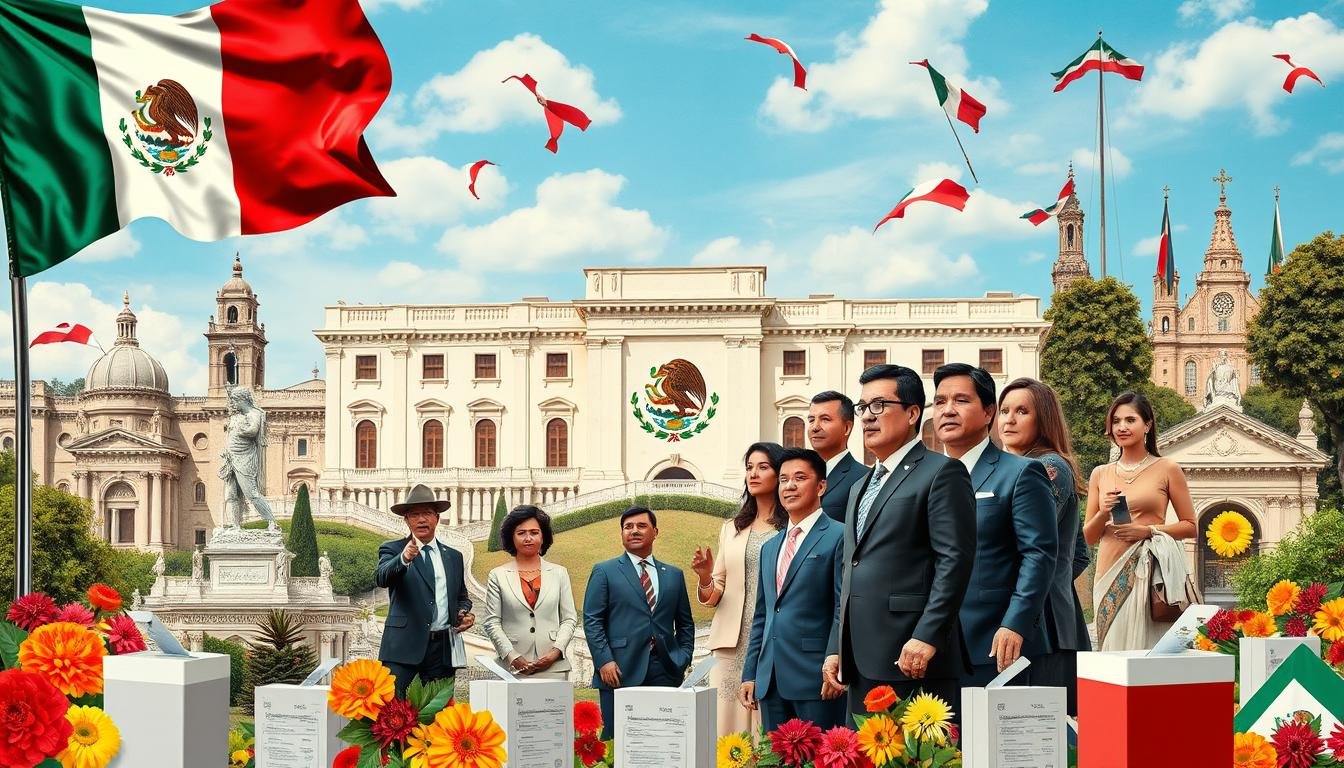Did you know Mexico’s politics are among the most exciting globally? It’s a mix of old and new, with a strong focus on democracy. We’ll explore the key players and interesting facts that make Mexico’s politics stand out. From women leaders to the unique customs of politicians, there’s a lot to learn.
Key Takeaways
- Mexico’s political system is a blend of traditional and modern democratic elements.
- Women are playing an increasingly prominent role in Mexican politics, breaking new ground.
- The country’s political parties have a significant influence on shaping the nation’s future.
- Mexico’s electoral processes and voting traditions are quite unique compared to other countries.
- Corruption and crime remain persistent challenges in the Mexican political landscape.
Mexico’s Political System: A Unique Blend of Democracy and Tradition
Mexico’s political system has changed a lot over time. It moved from a system where one party always won to a more open democracy. This change came from different political parties working together to guide the country.
The Evolution of Mexico’s Political Landscape
The story of Mexican political history is full of ups and downs. The Institutional Revolutionary Party (PRI) once ruled for many years. But now, other parties like the National Action Party (PAN) and the National Regeneration Movement (MORENA) are also important.
The Role of Political Parties in Shaping Mexico’s Future
These political parties face big challenges, like corruption and regional issues. They work hard to meet the needs and hopes of the Mexican people. Their plans and ideas have changed with the country’s new goals and what its citizens want.
As Mexico deals with these political changes, the role of these parties is key. They help shape the Mexican political system and affect everyday life.
Mexican Elections: A Vibrant Display of Civic Engagement
In Mexico, elections show how strong the country’s democracy is. People all over the nation show they care by voting to shape their future. They vote for president, congress, and local leaders with a lot of passion.
Recently, the way Mexico holds elections has changed a lot. These changes make voting more open and fair. This has made people trust the democratic process more.
Mexican elections are known for having a lot of people vote. People from different backgrounds come out to vote. This shows how important it is for them to have a say in their Mexican democracy.
| Election Year | Voter Turnout | Winning Candidate |
|---|---|---|
| 2018 | 63.4% | Andrés Manuel López Obrador |
| 2012 | 63.1% | Enrique Peña Nieto |
| 2006 | 58.6% | Felipe Calderón |
But it’s not just the big elections that are exciting. State and local elections show the variety of political views and strong local leadership. Everywhere, people take part in making decisions, making sure their voices are heard.
Mexico is always working to make its elections better and give power to its people. This shows the strength and energy of their Mexican democracy. It’s an example for others around the world.
Fun Facts About Mexico’s Politics: Know the Leaders
Mexico’s politics are full of diverse leaders and trailblazing women. They have made a big impact on the country. From Rosario Robles and Claudia Sheinbaum to the unique traits of Mexican politicians, the political scene is rich and interesting.
Trailblazing Women in Mexican Politics
In a place where men have often led, Mexican women have made their mark. Rosario Robles is known for her strong support of social justice and helping women in politics. Claudia Sheinbaum, the mayor of Mexico City, is a symbol of hope. She fights for a better future and equality.
Interesting Quirks and Traditions of Mexican Politicians
- Mexican presidents give their predecessors a replica of the presidential sash. This shows the peaceful handover of power.
- Many politicians wear bright, colorful clothes. They use traditional Mexican patterns and accessories.
- The mordida, or “little bite,” is a practice where officials ask for bribes. This is illegal but common.
These are just a few interesting things about Mexico’s politics. From the achievements of women to the unique customs, our politics are vibrant and inspiring.
The Impact of Mexico’s Political Reforms on Daily Life
Mexico’s political reforms have changed the daily lives of its people. They’ve brought new government policies and economic strategies. These changes affect jobs, wealth, and living standards, changing what’s possible for Mexicans.
Economic Transformations and Their Implications
Political reforms have brought big changes to Mexico’s economy. These changes affect jobs, pay, and access to resources. As the government restructures the economy, Mexicans face new challenges and chances in their daily lives.
- New jobs and changes in old industries
- Changes in who has wealth, affecting how much money people have and what they can buy
- Changes in what goods and services are available and how much they cost, affecting life quality
These economic changes from Mexico’s reforms have deeply affected its citizens. They shape what people experience, the chances they have, and their dreams.
Regional Dynamics: How Mexico’s States Shape National Politics
In Mexico, the mix of states and the national government is interesting. Each region has its own politics and economy. This mix makes Mexican governance complex. Knowing about these regional dynamics helps us understand Mexico’s politics better.
States in Mexico greatly affect national politics. Mexican regional politics help shape the government’s priorities and policies. State interests often meet or work together with the national government. This balance of power changes the country’s politics.
The influence of Mexican states on national politics grows because of Mexico’s system of government. States have a lot of power, letting them set their own goals. These goals might not always match the national goals. This state-federal interaction is key to Mexican politics.
Here are some examples of how regions affect politics:
- The northern states push for policies that help trade with the U.S. Southern states might want more social welfare programs.
- States with lots of resources in the center and north affect energy policies. Coastal states are important for sea and environmental laws.
- Political views in states can change national politics. Regional parties have become strong in some areas.
Knowing how influence of Mexican states on national politics works is key to understanding Mexico’s government. By seeing the different regional dynamics, we get a clearer picture of the challenges leaders face. They must balance the whole country’s needs with what each state wants.
Mexico’s International Influence: A Global Player on the Rise
Mexico is making a bigger mark on the world stage. It’s getting more involved in groups like the Pacific Alliance and the Organization of American States. It’s also playing a bigger part in the United Nations and the G20. This shows Mexico’s growing influence worldwide.
This international influence shows Mexico’s new goals and its wish to lead in global talks. It’s working with others to solve big world problems. This makes Mexico a major player in global events.
Mexico’s Role in Regional and International Organizations
Mexico is deeply involved in groups that work together for the good of all. This shows its support for working together and its aim to help shape the world. Here are some examples:
- It’s a key part of the Pacific Alliance. This group works to make it easier to move goods, services, money, and people between countries.
- In the Organization of American States (OAS), Mexico fights for important causes. These include better economies, human rights, and fair governments.
- At the G20, Mexico helps lead talks on the world economy, making it more stable and sustainable. It also talks about how to fight climate change.
- At the United Nations, Mexico speaks up for working together, solving conflicts, and improving human rights and the environment.
As Mexico’s role in global affairs changes, its influence is set to grow. This will make Mexico even more important on the world stage.

Controversies and Challenges in Mexican Politics
Mexico’s politics face many challenges and controversies. Corruption is a big issue, with bribery and crime syndicates affecting the government. This has hurt the trust in democracy and governance.
Crime and violence also affect politics in Mexico. Drug cartels and criminal groups have entered politics, using fear and violence to control. This has made people doubt the government’s ability to keep the peace and solve security problems.
Fixing these issues is hard. Governments have tried to fight corruption and crime, but it’s not easy. These problems are deep and widespread, making lasting solutions hard to find.
Yet, there is hope. People and groups are pushing for more openness and the rule of law. Some leaders are also focusing on fighting corruption and crime. This shows a new effort to tackle these big challenges.
Corruption and Crime: A Persistent Struggle
Corruption and crime are big problems in Mexican politics. Organized crime and bribery have hurt democracy. These issues have made people lose trust in their leaders and government.
- High-level corruption, like misuse of funds and giving contracts to friends, has made people angry.
- Drug cartels and criminals have entered politics, causing more violence. Politicians and officials are being targeted.
- Trying to stop corruption and crime is hard. Deep-rooted problems and the size of the issue make it tough to reform.
Even with big challenges, there are signs of change. People and groups are pushing for more openness and honesty. Some leaders are committed to fighting corruption and crime. The road ahead is tough, but the Mexican people’s strength and hope suggest progress is possible.
The Future of Mexican Democracy: Hopes and Aspirations
Mexico is looking to the future with hope and big dreams for its democracy. Reforms, active citizens, and the growth of political parties and institutions promise a better government. But, fighting corruption, crime, and regional differences is hard and needs ongoing work.
One big hope is making political institutions stronger. The future of Mexican democracy depends on these institutions following the law, holding fair elections, and representing everyone. Political parties must also stick to democratic values and work together for the country’s good.
Getting people involved in politics is key too. More people voting, taking part in decisions, and a strong civil society can keep leaders in check. This makes sure the government acts for the people.
- Working hard to stop corruption and make government open is vital for the future of Mexican democracy.
- Fixing regional differences and making sure development is fair across the country helps with a stable and fair politics.
- Building strong, independent democratic institutions, like courts and election bodies, protects the outlook on Mexican politics and keeps elections honest.
Even with challenges, many Mexicans feel hopeful and ready to build a better, fair, and democratic future. By facing the tough issues together, Mexico can keep making its democracy stronger. This will lead to a brighter future for all.

Conclusion: Embracing Mexico’s Political Diversity and Resilience
Mexico’s politics are complex and ever-changing, showing the country’s deep diversity and strength. The mix of democracy and tradition is fascinating. Political leaders and parties play big roles in this system. As Mexico looks to the future, it’s key to value this diversity and resilience to tackle challenges and meet the people’s dreams.
The strength of Mexico’s democracy shines through its political diversity. National and regional politics work together, with active parties and pioneering women leaders adding to the scene. This mix isn’t just interesting; it’s a base for growth. It lets different views come together and find new solutions.
Mexico’s politics show great resilience despite ongoing issues like corruption and crime. The country keeps adapting and changing. Political reforms, shifts in the economy, and its growing global role show its system’s strength. We hope this resilience will keep helping Mexico face its problems and seize new chances for its people.
FAQ
What is the structure of the Mexican government?
What are the main political parties in Mexico?
How do Mexican elections work?
What are some interesting facts about Mexican political leaders?
How have political reforms impacted the daily lives of Mexicans?
How do the dynamics between Mexico’s states influence national politics?
What is Mexico’s role on the global stage?
What are the main challenges and controversies in Mexican politics?
Source Links
- https://fortune.com/2024/09/04/why-nvidia-aggressive-sales-tactics-department-of-justic-investigation/ – Here’s why Nvidia’s aggressive sales tactics are in the DOJ’s crosshairs
- https://www.atlanticcouncil.org/job-opportunity/balkans-forward-congressional-fellowship-europe-center/ – Balkans Forward Congressional Fellows, Europe Center
- https://careers.intuitive.com/en/jobs/744000011631435/JOB9057/accounting-analyst-intern/ – Accounting Analyst Intern

